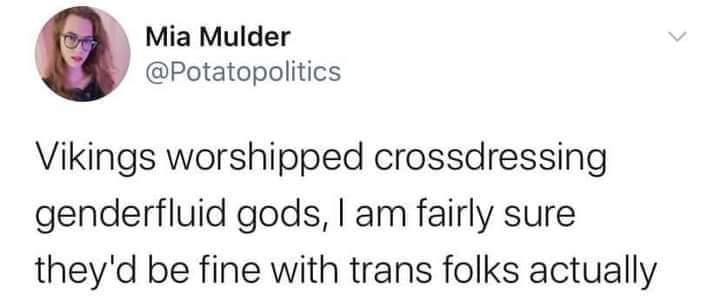this post was submitted on 28 May 2024
859 points (93.9% liked)
Microblog Memes
5754 readers
2235 users here now
A place to share screenshots of Microblog posts, whether from Mastodon, tumblr, ~~Twitter~~ X, KBin, Threads or elsewhere.
Created as an evolution of White People Twitter and other tweet-capture subreddits.
Rules:
- Please put at least one word relevant to the post in the post title.
- Be nice.
- No advertising, brand promotion or guerilla marketing.
- Posters are encouraged to link to the toot or tweet etc in the description of posts.
Related communities:
founded 1 year ago
MODERATORS
you are viewing a single comment's thread
view the rest of the comments
view the rest of the comments

Read more norse mythology for smart people at
https://norse-mythology.org/gods-and-creatures/the-aesir-gods-and-goddesses/odin/
He’s a war-god, but also a poetry-god, and he has prominent “effeminate” qualities that would have brought unspeakable shame to any historical Viking warrior.
cal tradition known as seidr, of which Odin and Freya are the foremost divine practitioners. In traditional Germanic society, for a man to engage in seidr was effectively to forsake the male gender role, which brought considerable scorn upon any male who chose to take up this path. As the sagas show, this didn’t stop some men from practicing seidr anyway. However, even Odin wasn’t exempt from such charges of “unmanliness,” and was taunted for adopting the feminine traits and tasks that form part of the backbone of seidr. Saxo, in the passage on Odin’s exile alluded to above, relates that “by his stage-tricks and his assumption of a woman’s work he had brought the foulest scandal on the name of the gods.”[16] Note also the reference to being “fertilized” in the verse quoted above – while this is certainly a metaphor, it’s a metaphor loaded with sexual implications that would have been immediately recognizable to any Viking Age or medieval reader or hearer of the poem. A fuller discussion of the relationship between Germanic shamanism and gender roles can be found here: https://norse-mythology.org/concepts/shamanism/